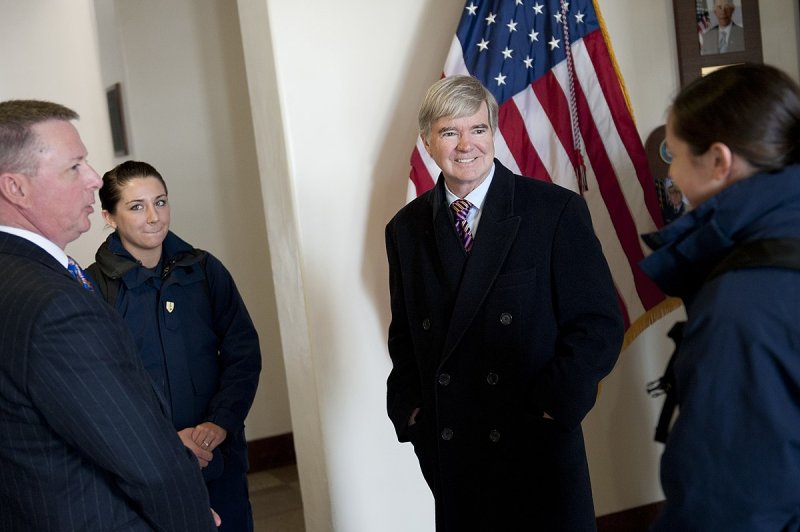NCAA President Mark Emmert (C), shown Feb. 6, 2014, said the organization will continue to work with Congress to find a permanent solution at the national level. Photo courtesy of
U.S. Coast Guard Academy/Wikimedia Commons
June 30 (UPI) -- The NCAA's board of directors approved a temporary policy that will allow student-athletes to receive compensation for the use of their names, images and likenesses, the organization announced Wednesday.
The decision comes after years of debate surrounding NIL rights and just one day before more than a dozen states officially implement laws that will make it illegal for universities to follow the long-standing NCAA guidelines that have prevented student-athletes from monetizing their names, images and likenesses.
"This is an important day for college athletes since they all are now able to take advantage of name, image and likeness opportunities," NCAA President Mark Emmert said in a statement. "With the variety of state laws adopted across the country, we will continue to work with Congress to develop a solution that will provide clarity on a national level.
"The current environment -- both legal and legislative -- prevents us from providing a more permanent solution and the level of detail student-athletes deserve."
The board of directors emphasized Wednesday that its rule changes are intended to be temporary to ensure that all athletes have an opportunity to profit from NIL as state laws begin to go into effect Thursday. The NCAA is hoping that Congress will help enact a uniform national law that allows for clearer regulations for future NIL deals.
The NCAA's decision effectively suspends previous restrictions on payments to student-athletes for sponsorship deals, endorsements, personal appearances and other NIL-related ventures. The ruling applies to all three NCAA divisions and more than 460,000 athletes.
The new rules also will allow student-athletes the ability to enter into agreements with agents or other representatives to acquire endorsement deals, though athletes are expected to keep their schools informed of any NIL arrangements.
Some NIL opportunities will be restricted, but the various types of limitations will vary based on state laws and policies instituted by individual schools. For example, some but not all state laws prevent student-athletes from endorsing tobacco, alcohol or gambling products.
Schools in states without NIL guidelines will be able to create their own policies to resolve any disputes that may arise.
Current NCAA rules that prohibit universities from paying players directly remain unchanged. The board directed schools to verify that payments to athletes are not based on their athletic achievements or used as recruiting inducements.
The NCAA's interim policy comes less than two weeks after the U.S. Supreme Court ruled against the organization in a case involving education-related benefits. That 9-0 ruling is expected to impact issues related to compensation for student-athletes and open the door for future legal challenges.
Justice Neil Gorsuch wrote the opinion, which upheld a district court judge's decision that the NCAA was violating antitrust law by putting limits on the education-related benefits that universities can provide to athletes. The ruling allows schools to give athletes unlimited compensation as long as it is connected to their education.















